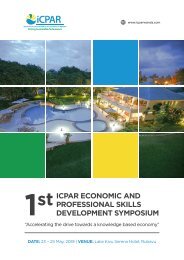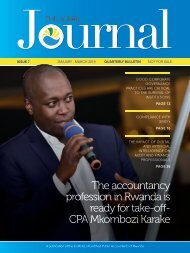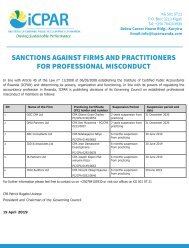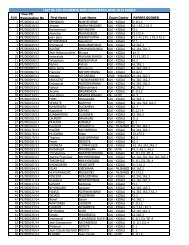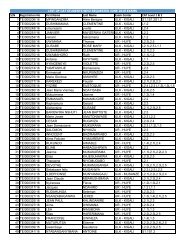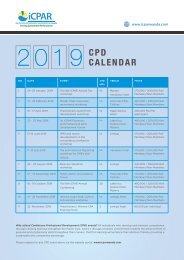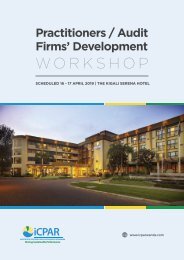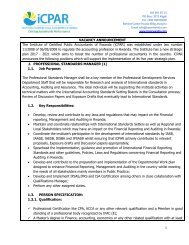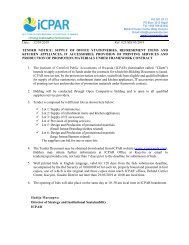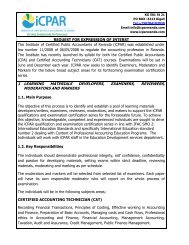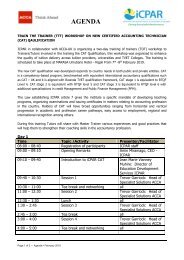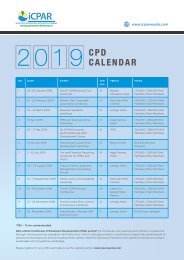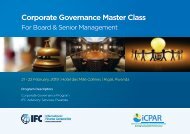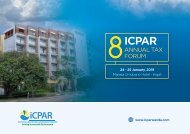iCPARQuarterlyBulletin-September2017
You also want an ePaper? Increase the reach of your titles
YUMPU automatically turns print PDFs into web optimized ePapers that Google loves.
Journal<br />
THE iCPAR<br />
ISSUE 1<br />
JULY - SEPTEMBER 2017<br />
iCPAR QUATERLY BULLETIN<br />
NOT FOR SALE<br />
WE WILL BUILD ON<br />
ACHIEVEMENTS TO<br />
INCREASE iCPAR’S<br />
CONTRIBUTION TO<br />
SOCIETY<br />
PAGE 6<br />
NEW CEO TO FOCUS<br />
ON SUSTAINABILITY &<br />
RELEVANCE<br />
PAGE 9<br />
NEW CAT<br />
QUALIFICATIONS<br />
FRAMEWORK TO FOCUS<br />
ON RELEVANT SKILLS<br />
PAGE 13<br />
iCPAR unveils<br />
NEW STRATEGIC PLAN<br />
to create a platform for sustainability & relevance<br />
A publication of the Institute of Certified Public Accountants of Rwanda
ABOUT US<br />
The Institute is the sole professional accountancy<br />
organization established by law 11/2008 of 6 th May<br />
2008 with a broad mandate to grow and regulate the<br />
accountancy profession.<br />
WHAT WE DO<br />
We regulate the accountancy profession; We preserve<br />
the integrity of the accounting profession; We promote<br />
the competence and the capacities of own members.<br />
We deliver accounting qualifications, programs and<br />
examination.We promote compliance with professional<br />
standards<br />
VISION<br />
A strong, relevant and sustainable profession<br />
MISSION<br />
To build a strong and engaged professional<br />
accountancy organization that anticipates stakeholder<br />
expectations and acts in the public interest<br />
OUR OFFICE<br />
Address: KG 541 Street, Prester House<br />
P.o.Box: 3213 Kigali Rwanda<br />
T: +250 784103930<br />
F: +250 280103930<br />
E: info@icparwanda.com
THE iCPAR JOURNAL<br />
3<br />
Inside this Issue<br />
6 12<br />
14<br />
4. Foreword<br />
5. 8 th AGM elects<br />
governing council and<br />
unveils a new strategy<br />
6. We will build on<br />
achievements to<br />
increase iCPAR’s<br />
contribution to society<br />
8. iCPAR unveils new<br />
strategic plan to<br />
create a platform<br />
for sustainability &<br />
relevance<br />
DISCLAIMER<br />
9. New CEO to focus<br />
on Sustainability &<br />
Relevance<br />
10. VAT as a cost to Banks<br />
for outsourced services<br />
12. Legal framework<br />
revision is critical to<br />
meet iCPAR evolving<br />
needs<br />
13. New CAT<br />
Qualifications<br />
Framework to focus on<br />
relevant skills<br />
PUBLISHER<br />
13. The Fee review<br />
14. The Events Calendar<br />
15. June 2017 Examination<br />
Results<br />
15. Humour<br />
Reproduction of any article in this journal<br />
without permission is prohibited. The editor<br />
reserves the right to use, edit or shorten<br />
articles for accuracy, space and relevance<br />
Copyright © iCPAR 2017. All rights reserved.<br />
Copyrights and all / or other intelectual property rights on<br />
all designs, graphics, logos, images, phots, texts, trade<br />
names, trademarks, etc in this publication are reserved.<br />
The reproduction, transmission or modification of any part<br />
of the contents of this publication is strictly prohibited.<br />
OUR OFFICE<br />
Address: KG 541 Street, Prester House<br />
P.o.Box: 3213 Kigali Rwanda<br />
T: +250 784103930<br />
F: +250 280103930<br />
E: info@icparwanda.com<br />
DISCLAIMER<br />
Views expressed in the journal are not necessarily those of the institute, management<br />
and employees.<br />
A PUBLICATION OF THE INSTITUTE OF CERTIFIED PUBLIC ACCOUNTANTS OF RWANDA<br />
JULY - SEPTEMBER 2017
4 Journal<br />
THE iCPAR<br />
Foreword<br />
Dear iCPAR Member,<br />
As a way of deepening our interaction with<br />
you and the various stakeholders, we have<br />
launched the iCPAR quarterly news bulletin<br />
that is aimed at sharing a snapshot of what<br />
we do to promote the accountancy profession<br />
in Rwanda. Hence, I am very pleased to<br />
share with you our first edition of this quarterly<br />
bulletin and look forward to many more<br />
subsequent issues.<br />
The main part of this bulletin sheds light on<br />
iCPAR’s 8th Annual General Meeting, our<br />
new five year strategic plan and election of<br />
governing council and disciplinary committee.<br />
It also highlights the appointment of<br />
the new chief executive officer and what he<br />
brings on board, why we are pursuing the legal<br />
review and more interesting articles.<br />
I would like to attract your attention on the<br />
important upcoming events such as the 6 th<br />
iCPAR annual seminar, the 4 th iCPAR Public<br />
Accountability Forum and the 7th iCPAR Internal<br />
Audit, Control, and risk management<br />
conference among others. You will find more<br />
details of these events in the bulletin.<br />
I would like to encourage members to<br />
contribute to this quarterly bulletin<br />
by publishing articles and important<br />
information regarding our profession.<br />
The onus is upon us promote the<br />
accountancy profession and one of the<br />
means to do that is by telling our own<br />
story.<br />
AMIN MIRAMAGO<br />
iCPAR CEO | SG<br />
Finally, I would like to encourage members<br />
to contribute to this quarterly bulletin by<br />
publishing articles and important information<br />
regarding our profession. The onus is upon us<br />
to promote the accountancy profession and<br />
one of the means to do that is by telling our<br />
own story.<br />
With best wishes,<br />
AMIN MIRAMAGO<br />
Chief Executive Officer | Secretary General<br />
iCPAR QUATERLY BULLETIN<br />
JULY - SEPTEMBER 2017
THE iCPAR JOURNAL<br />
5<br />
8 th AGM elects governing<br />
council and unveils a new<br />
strategy<br />
The Institute of Certified Public<br />
Accountants of Rwanda<br />
(iCPAR) held the eighth Annual<br />
General Meeting (AGM) on<br />
24 th March 2017. Attended by 260<br />
members, the annual meet focused<br />
on key issues including.<br />
• Election of Governing Council<br />
and disciplinary commission<br />
members.<br />
• Reappointment of two Education<br />
Commissioners<br />
• Unveiling the new iCPAR strategy,<br />
and<br />
• Adoption and Approval of new<br />
The following individuals were elected on ICPAR Governing Council:<br />
membership and practice fees.<br />
The assembly also discussed the<br />
Governing Council Report, Audited<br />
Financial Statements, Appointment<br />
of the auditor and the 2017<br />
budget as well as member issues.<br />
ICPAR DISCIPLINARY<br />
COMMITTEE<br />
Chairperson: CPA Godwin<br />
Akankunda<br />
CPA Deogratias Dushimumukiza<br />
CPA Jules Cesar Hategekimana<br />
CPA Mathias Bakareke Binama<br />
CPA BOSCO KARAKE MKOMBOZI<br />
iCPAR President<br />
CPA INNOCENT BULINDI<br />
iCPAR Vice-President<br />
CPA FRED MUGARURA<br />
Council Member<br />
CPA NATHALIE MPAKA<br />
Council Member<br />
CPA ALLAN GICHUHI<br />
Council Member<br />
CPA FLORENCE GATOME<br />
Council Member<br />
CPA MARK NKURUNZIZA<br />
Council Member<br />
A PUBLICATION OF THE INSTITUTE OF CERTIFIED PUBLIC ACCOUNTANTS OF RWANDA<br />
JULY - SEPTEMBER 2017
6 Journal<br />
THE iCPAR<br />
Q&A<br />
WITH<br />
CPA BOSCO<br />
MKOMBOZI<br />
KARAKE<br />
PRESIDENT OF ICPAR’S<br />
GOVERNING COUNCIL<br />
We will build on<br />
achievements to<br />
increase ICPAR’s<br />
contribution to<br />
society<br />
iCPAR was established in 2008<br />
to promote and regulate the accountancy<br />
profession in Rwanda.<br />
Nine years down the road, the<br />
institute has registered significant<br />
progress such as registering certified<br />
accountants and technicians,<br />
rolling out its own accounting<br />
qualification, admission of iCPAR<br />
into regional and international<br />
professional accountancy bodies<br />
among others.<br />
But for it to sustain those results and<br />
carter for changing needs of the<br />
profession, iCPAR has embarked<br />
on the second phase of development<br />
that will ensure continuity at<br />
the same time realise its ambitions.<br />
iCPAR Journal caught up with CPA<br />
Bosco Mkombozi Karake, the President<br />
of iCPAR’s Governing Council<br />
for insights into the new direction<br />
the institute is taking<br />
iCPAR JOURNAL: IN MARCH YOU<br />
LAUNCHED ICPAR NEW FIVE-<br />
YEAR STRATEGY. WHAT DO YOU<br />
HOPE TO ACHIEVE WITH IT?<br />
BOSCO MKOMBOZI KARAKE:<br />
The new strategy lead to a revision<br />
iCPAR QUATERLY BULLETIN<br />
JULY - SEPTEMBER 2017
THE iCPAR JOURNAL<br />
7<br />
of both our mission and vision.<br />
The revised Vision is; “A strong,<br />
relevant and sustainable profession”<br />
and our revised mission is;<br />
“To build a strong and engaged<br />
professional accountancy organisation<br />
that anticipates stakeholder<br />
expectations and acts in the public<br />
interest.”<br />
From our vision and mission, you<br />
can derive that we want to build<br />
on the achievements of iCPAR so<br />
far, in its few years of existence (we<br />
become 10 years in late 2018) and<br />
rapidly take the necessary steps<br />
that will increase our contribution<br />
to our society. This will be achieved<br />
by enhancing the services we offer<br />
to our students, members and other<br />
stakeholders.<br />
iCPAR JOURNAL: iCPAR<br />
HAS CALLED FOR LAW<br />
REFORMS TO CATER FOR THE<br />
EVOLVING NEEDS OF THE<br />
ACCOUNTANCY PROFESSION.<br />
WHAT ARE THE SPECIFIC<br />
LAWS THAT ARE CURTAILING<br />
THE DEVELOPMENT OF THE<br />
PROFESSION AND IN WHAT<br />
WAY? WHEN DO YOU HOPE TO<br />
COMPLETE THE REFORMS?<br />
BOSCO MKOMBOZI KARAKE:<br />
iCPAR was established by act<br />
no.11/2008 of 6 th May 2008 with<br />
the sole mandate of regulating and<br />
promoting the accountancy profession<br />
in the country. Under this dispensation,<br />
the institute is responsible<br />
for registering and granting<br />
practicing certificates to certified<br />
public accountants, monitoring of<br />
compliance with professional standards,<br />
investigation and discipline<br />
and delivery and examination<br />
of the accounting qualifications<br />
among others. Drawing from this<br />
wide-ranging mandate, it is clear<br />
that the legal environment in the<br />
country is quite robust enough to<br />
allow for the development of the<br />
accountancy profession. However,<br />
a lot has changed since the establishment<br />
of the institute in 2008<br />
and there will be need to upgrade<br />
the legal framework and harmonize<br />
it with other laws that impact<br />
the profession. A case in point is<br />
the company law that was enacted<br />
after the institute law.<br />
So the issue is to make the law<br />
more robust to assist iCPAR in fulfilling<br />
its mandate. For example, we<br />
have the legal mandate to regulate<br />
persons who provide opinions on<br />
financial statements, these are the<br />
Auditors, we however have people<br />
offering this service who do not<br />
qualify to do so. We hope the upgrade<br />
of the law and the way that it<br />
will be communicated to the general<br />
public and other stakeholders<br />
will strengthen the accountancy<br />
profession in Rwanda.<br />
iCPAR JOURNAL: THE<br />
INSTITUTE HAS UNDERGONE<br />
EXTENSIVE RESTRUCTURING<br />
BEGINNING WITH A NEW CEO.<br />
DOES THIS SIGNAL A NEW<br />
APPROACH OF DOING THINGS?<br />
HOW DOES THE INSTITUTE<br />
STAND TO GAIN FROM THE<br />
CHANGES?<br />
BOSCO MKOMBOZI KARAKE: To<br />
achieve one of our strategic objectives<br />
of being a sustainable organisation,<br />
we need a capable secretariat.<br />
We therefore have to come up<br />
with what we consider to be an appropriate<br />
organisational structure<br />
and are in the process of filling in<br />
key positions. With the right people<br />
both in terms of numbers but<br />
very importantly in capability, we<br />
should be able to make significant<br />
progress in the achievement of our<br />
objectives.<br />
iCPAR JOURNAL: THERE IS<br />
A PERCEPTION THAT THE<br />
ACCOUNTANCY PROFESSIONAL<br />
IS BORING. OF COURSE THIS<br />
ISN’T TRUE. WHAT CAN BE<br />
DONE TO REVERSE THIS<br />
THINKING?<br />
BOSCO MKOMBOZI KARAKE:<br />
This is quite a tricky question.<br />
Many accountants provide support<br />
functions and spend long hours<br />
behind their computers cracking<br />
numbers- believe me many<br />
derive a lot of joy from cracking<br />
numbers and that alone gives them<br />
fulfilment. However, accountants<br />
have been stereotyped as boring<br />
although I personally know many<br />
fun and exciting accountants.<br />
I think it is important to<br />
communicate to especially<br />
the young that accounting is a<br />
profession that introduces a person<br />
to a language of business and as a<br />
Certified Accountant you can have<br />
a career in Financial reporting,<br />
auditing, forensic accounting,<br />
corporate finance, business<br />
recovery, insolvency, tax advisory,<br />
risk management and consulting<br />
among others-the opportunities<br />
to work across all sectors should<br />
also be a big appeal. By the time<br />
people know of all these exciting<br />
career options, they will know that<br />
being a professional accountant is<br />
certainly exciting.<br />
A PUBLICATION OF THE INSTITUTE OF CERTIFIED PUBLIC ACCOUNTANTS OF RWANDA<br />
JULY - SEPTEMBER 2017
8 Journal<br />
THE iCPAR<br />
iCPAR unveils new<br />
strategic plan to create a<br />
platform for sustainability<br />
& relevance<br />
In March iCPAR unveiled a five<br />
year strategic plan (2017-2021)<br />
that will guide the institute as it<br />
seeks to become a financially viable<br />
and sustainable organization with<br />
solid capacity to effectively support<br />
the growth of the profession in<br />
Rwanda and the region.<br />
The overarching objective of the<br />
FIGURE 2A: ICPAR STRATEGY MAP<br />
strategy is to enable the institute to<br />
meet the demand of high-quality<br />
professional accountants and technicians<br />
which are essential to grow<br />
Rwanda’s economy.<br />
“Our approach is sustainable in a<br />
way that deepens relevance across<br />
stakeholder groups driven by our<br />
values of integrity, public interest,<br />
professionalism and innovation”,<br />
Bosco Karake Mkombozi, the president<br />
of iCPAR’s Governing Council<br />
VISION: A strong, relevant and sustainable profession<br />
pointed out.<br />
Built on past accomplishments, the<br />
new strategy maps a path for the<br />
second phase of iCPAR development.<br />
It will focus on strengthening<br />
qualification framework, enhance<br />
membership base and value, expand<br />
revenue streams and strengthen<br />
stakeholder value.<br />
BELOW IS THE STRATEGY MAP THAT SHOWS THE LOGICAL CONNECTION BETWEEN THE STRATEGY<br />
INSTITUTE OF CERTIFIED PUBLIC ACCOUNTANTS OF RWANDA<br />
Driving Sustainable Performance<br />
OBJECTIVES AND PERFORMANCE DRIVERS THAT WILL IN TURN LEAD TO VALUE CREATION.<br />
ICPAR FIVE-YEAR STRATEGY (2017 – 2021)<br />
MISSION: To build a strong and engaged professional accountancy organisation that consistently<br />
anticipates and delivers on stakeholders expectations while acting firmly in the public interest.<br />
ICPAR STRATEGY IN BRIEF<br />
STRATEGIC PILLARS<br />
1. SUSTAINABILITY<br />
2. RELEVANCE<br />
3. STRONG PROFESSION<br />
Strategic Pillar Results (SPR)<br />
ICPAR is increasingly sustainable through a sound<br />
financial base (strong member growth and diversified<br />
revenue streams); a capable secretariat; and<br />
ICPAR STRATEGY MAP<br />
supported by an appropriate infrastructure.<br />
ICPAR has an energised membership engaging at all<br />
levels; an effective stakeholder engagement on public<br />
interest matters; and is a profession that anticipates<br />
and delivers what the market needs.<br />
A professional brand increasingly at the top of career<br />
choices (brand recognition and student choices);<br />
appropriately regulated; and a membership that is not only<br />
employable but increasingly influential in the boardrooms.<br />
STRATEGIC OBJECTIVES AND STRATEGY MAP<br />
OBJECTIVE MEASURES<br />
STRATEGIC OBJECTIVES AND STRATEGY MAP<br />
TARGETS<br />
Y0 Y1 Y2 Y3 Y4 Y5<br />
KEY INITIATIVES<br />
STAKEHOLDERS<br />
STAKEHOLDERS<br />
FINANCIAL<br />
STEWARDSHIP<br />
FINANCIAL<br />
STEWARDSHIP<br />
INTERNAL<br />
PROCESSES<br />
INTERNAL<br />
PROCESS<br />
INSTITUTIONAL CAPACITY<br />
INSTITUTIONAL<br />
CAPACITY<br />
ESTABLISH<br />
APPROPRIATE<br />
INFRASTRUCTURE<br />
STRENGTHEN<br />
MEMBER VALUE<br />
EXPAND REVENUE<br />
STREAMS<br />
STRENGTHEN THE<br />
QUALIFICATION<br />
FRAMEWORK<br />
GROW THE<br />
PROFESSION<br />
STRENGTHEN<br />
STAKEHOLDER VALUE<br />
STRENGTHEN<br />
MEMBER VALUE<br />
GROW THE<br />
MEMBERSHIP BASE<br />
EXPAND REVENUE<br />
STREAMS<br />
BUILD CAPACITY<br />
TO COMPLY<br />
WITH SMOs<br />
STRENGTHEN THE<br />
QUALIFICATION<br />
FRAMEWORK<br />
% Composite Net Promoter None 14 16 18 20 22 Undetake a re-branding of the Institute (Brand strategy<br />
Score (SO 10) GROW THE<br />
and a 3 year comminication plan)<br />
PROFESSION<br />
% of key stakeholders None 50 58 66 74 84 Develop and implement a public interest stakeholder<br />
satisfied with ICPAR ( SO 9)<br />
collaboration strategy (Thought leadership and partnerships)<br />
% of Members satisfied with<br />
ICPAR (SO 8)<br />
Amount of internally<br />
generated revenues in<br />
millions of US$ (SO 7)<br />
Total # of ICPAR members in<br />
good standing (SO 6)<br />
# of students completing<br />
ICPAR Qualification ( SO 5)<br />
% of outcomes achieved for<br />
SMO compliance (SO 4)<br />
% of ICPAR’s Strategic<br />
outcomes achieved (SO 3)<br />
% of completion of annual<br />
Instrastructure plans (SO 2)<br />
None 50 56 62 68 75 STRENGTHEN<br />
Establish a member engagement strategy and a lifelong<br />
learning suport framework<br />
STAKEHOLDER VALUE<br />
0.34 0.55 0.74 1.12 1.23 1.43 Develop a long-term revenue enhancement strategy<br />
253 270 319 430 564 720 Develop a membership growth strategy and collaborate<br />
GROW to establish THE a sustainable “revolving education fund”<br />
MEMBERSHIP BASE<br />
19 32 57 94 121 149 Establish an enhanced CAT and CPA Qualifications; a<br />
competence framework with new market driven pathways;<br />
and strengthen the examination delivery process<br />
None 70 75 80 85 90 Empower the Institute’s Commisions to drive SMOs<br />
None 60% 70% 80% 88%<br />
BUILD compliance CAPACITY<br />
95% TO Restructure COMPLY and align internal capabilities to deliver<br />
WITH mandate SMOs (Structure, people and perfromance systems)<br />
None 85% 85% 85% 85% 85% Establish an appropriate MIS platform to deliver the<br />
mandate; and secure “own-premises” for current needs<br />
and income generation<br />
STRENGTHEN<br />
STRENGTHEN<br />
INSTITUTIONAL<br />
LEGAL<br />
CAPACITY<br />
FRAMEWORK<br />
% of key stakeholders aware None 0 50 66 78 90 Review and update the ICPAR law and its bi-laws<br />
ESTABLISH<br />
of amended laws (SO STRENGTHEN<br />
1)<br />
STRENGTHEN<br />
APPROPRIATE<br />
INSTITUTION<br />
LEGAL<br />
INFRASTRUCTURE OUR VALUES: Integrity; Public Interest; CAPACITY Professionalism; and Innovation (IPPI) FRAMEWORK<br />
25<br />
OUR VALUES: Integrity; Public Interest; Professionalism; and Innovation (IPPI)<br />
iCPAR QUATERLY BULLETIN<br />
JULY - SEPTEMBER 2017
THE iCPAR JOURNAL<br />
9<br />
New CEO to focus on<br />
Sustainability & Relevance<br />
iCPAR CEO Amin Miramago<br />
plans to make sustainability and<br />
relevance the key pillars of his<br />
tenure and transform the institute<br />
into a professional accountancy<br />
organization that serves the core<br />
needs of its stakeholders<br />
“I will work to ensure that we have<br />
the enablers for future growth at<br />
the same time ensuring that the<br />
institute is present in the right conversations.<br />
I look forward to working<br />
with our stakeholders to deliver<br />
on the iCPAR Mandate,” Mr. Miramago<br />
says.<br />
In March 2017, iCPAR recruited<br />
Amin Miramago as its new Chief<br />
Executive Officer. His recruitment<br />
was part of the institute’s restructuring<br />
plan to ensure effectiveness.<br />
As iCPAR enters its second phase<br />
of development which will focus<br />
on institutional sustainability<br />
and relevance, the new CEO will<br />
be charged with aligning internal<br />
capabilities and skills to the institute’s<br />
mission.<br />
Before his appointment Mr. Miramago<br />
was the iCPAR Program<br />
Coordinator for the IFAC PAO Capacity<br />
Building Program. He was<br />
an active member of the education<br />
and curriculum commission since<br />
2012. Mr. Miramago has been<br />
integral to the Government of<br />
Rwanda’s Public Financial Management<br />
(PFM) reforms. He particularly<br />
served as PFM reforms<br />
manager for government. He<br />
also has substantial boardroom<br />
experience. Mr. Miramago replaced<br />
Mr. John Munga who led<br />
the institution from 2013.<br />
As part of its restructuring drive,<br />
iCPAR is currently recruiting various<br />
professionals to fill management<br />
and regular positions. The<br />
restructuring is critical to building<br />
a strong and engaged professional<br />
accountancy organization that<br />
consistently anticipates and delivers<br />
on stakeholder expectations.<br />
I will work to ensure that we have<br />
the enablers for future growth at the<br />
same time ensuring that the institute<br />
is present in the right conversations.<br />
I look forward to working with our<br />
stakeholders to deliver on the iCPAR<br />
Mandate.<br />
AMIN MIRAMAGO<br />
iCPAR CEO | SG<br />
A PUBLICATION OF THE INSTITUTE OF CERTIFIED PUBLIC ACCOUNTANTS OF RWANDA<br />
JULY - SEPTEMBER 2017
10 Journal<br />
THE iCPAR<br />
VAT as a cost to Banks for<br />
outsourced services<br />
By Paul Frobisher Mugambwa<br />
The competitive business<br />
climate has put additional<br />
pressure on business to reduce<br />
the cost of conducting business<br />
and become more efficient<br />
by focusing more on their core<br />
business. The increasing reliance<br />
on technology coupled with its<br />
increased complexity has made<br />
outsourcing of services a popular<br />
option.<br />
However, VAT exemption for<br />
banks, inhibits the use of outsourcing<br />
for these services as it creates<br />
a price differential between the<br />
cost of contracting and performing<br />
service in-house. This, in turn, provides<br />
a disincentive for such companies<br />
to seek outside expertise<br />
and negatively impacts their competitiveness<br />
in the marketplace<br />
Banks cannot recover all the VAT<br />
that they pay on goods and services<br />
they buy since they do not charge<br />
VAT on many of their services. As<br />
banks outsource their activities,<br />
the external provider is required<br />
to charge VAT. However this VAT is<br />
not recoverable in full.<br />
For example if a bank outsourced<br />
some of it workforce e.g. tellers,<br />
direct sales executives or cash in<br />
transit services, the provider of<br />
iCPAR QUATERLY BULLETIN<br />
JULY - SEPTEMBER 2017
THE iCPAR JOURNAL<br />
11<br />
the workforce or services will be<br />
required to charge VAT. On the<br />
other hand, if the bank provided<br />
the workforce in-house to itself, it<br />
would not have to pay VAT. Thus,<br />
the cost of services in-house would<br />
automatically be less expensive by<br />
18% than outsourcing.<br />
Outsourcing therefore carries a<br />
hidden tax cost for banks. Thus,<br />
a bank would only acquire outside<br />
services when the perceived<br />
value of obtaining those services<br />
externally exceeds the cost of inhouse<br />
provision by the amount of<br />
the VAT.<br />
As the Government recognizes that<br />
stimulating the private sector- particularly<br />
with regard to competitiveness-<br />
is not achievable without<br />
broadening and deepening the<br />
financial sector such as banking,<br />
insurance, there are a number of<br />
possible measures the Government<br />
can introduce to put banks in the<br />
same VAT position whether they<br />
outsourced the contract or undertook<br />
the contract in-house. Also<br />
this would increase opportunities<br />
for Rwanda entrepreneurs.<br />
One option would be to shift the<br />
exemption from VAT further down<br />
the supply chain so that the service<br />
outsourced to a third party would<br />
be exempt from VAT. This would<br />
ensure that these costs would not<br />
bear VAT and hence would provide<br />
parity between an in-house service<br />
and an outsourced service.<br />
However, this solution only resolves<br />
the limited subset of outsourcing<br />
contracts that are core<br />
Banks cannot recover all<br />
the VAT that they pay on<br />
goods and services they buy<br />
since they do not charge VAT<br />
on many of their services.<br />
As banks outsource their<br />
activities, the external<br />
provider is required to charge<br />
VAT. However this VAT is not<br />
recoverable in full.<br />
For example if a bank<br />
outsourced some of it<br />
workforce e.g. tellers, direct<br />
sales executives or cash in<br />
transit services, the provider<br />
of the workforce or services<br />
will be required to charge<br />
VAT. On the other hand, if the<br />
bank provided the workforce<br />
in-house to itself, it would<br />
not have to pay VAT. Thus,<br />
the cost of services in-house<br />
would automatically be<br />
less expensive by 18% than<br />
outsourcing.<br />
PAUL FROBISHER<br />
MUGAMBWA<br />
ASSOCIATE DIRECTOR AT PWC<br />
RWANDA LIMITED<br />
to processing financial transactions.<br />
The VAT distortion would<br />
remain for the vast majority of outsourcing<br />
scenarios. A more universal<br />
solution would be a widening<br />
of the VAT exemptions to encompass<br />
outsourced services provided<br />
to banks, by allowing exemption<br />
only where the business provides<br />
predominantly exempt services.<br />
A second option involves accepting<br />
that VAT will be charged on the<br />
contract but allowing the Banks to<br />
recover part of the VAT so that it<br />
again finds itself in a similar position<br />
as if it had undertaken the<br />
contract in-house. Some Governments<br />
like the Australian Government<br />
chose this solution when<br />
introducing their VAT system. The<br />
VAT exempt business is automatically<br />
entitled to reclaim from the<br />
tax authorities a fixed proportion of<br />
the VAT incurred on the outsourcing<br />
contract. The proportion to be<br />
recovered is set at an estimate of<br />
the labour element of the underlying<br />
contract – 75% was chosen in<br />
Australia.The balance is treated as<br />
input tax in accordance with the<br />
“normal” rules.<br />
Another alternative is to leave the<br />
VAT provisions the same but alter<br />
the amount that should be applied<br />
to VAT. This involves disregarding<br />
the actual amount of the contract<br />
and replacing this with a value that<br />
would have been subject to VAT<br />
under the in-house scenario (25%<br />
in the above example).<br />
In conclusion the Government<br />
should consider implementing<br />
measures to introduce VAT parity<br />
for Banks to encourage outsourcing<br />
their services as a means of<br />
improving competitiveness and<br />
economic growth.<br />
Paul Frobisher Mugambwa is<br />
an Associate Director at PwC<br />
Rwanda Limited.<br />
Email frobsiher.mugambwa@pwc.<br />
com<br />
A PUBLICATION OF THE INSTITUTE OF CERTIFIED PUBLIC ACCOUNTANTS OF RWANDA<br />
JULY - SEPTEMBER 2017
12 Journal<br />
THE iCPAR<br />
Legal framework<br />
revision is critical<br />
to meet iCPAR<br />
evolving needs<br />
iCPAR is leading efforts to have<br />
the legal framework establishing<br />
the institute revised to cater for<br />
the ever changing needs of the profession.<br />
In 2008, iCPAR was set up through<br />
an act of parliament with a broad<br />
mandate to grow and regulate the<br />
accountancy profession. Subsequently,<br />
a legal framework was put<br />
in place to ensure that the institute<br />
operates as a legal entity.<br />
Eight years on, with the need to<br />
face realities on the ground and<br />
live up to best practices, it became<br />
imperative that a legal review be<br />
conducted for the institute to keep<br />
up with changing times. In fact the<br />
2015 World Bank Report on Observance<br />
of Standards and Codes<br />
in Accounting and Auditing made a<br />
similar observation. It recommended<br />
revision of the legal framework<br />
and governance arrangements to<br />
meet iCPAR evolving needs.<br />
In partnership with the Ministry of<br />
Finance and Economic Planning,<br />
iCPAR worked with World Bank to<br />
facilitate a consultative review process<br />
that will identify and propose<br />
recommendations on the legal and<br />
governance frameworks that will<br />
position iCPAR to attain international<br />
recognized standards and<br />
becoming a full member of IFAC.<br />
In their first mission in February<br />
and March 2017, the World Bank<br />
through a consultative and participatory<br />
process involving many<br />
stakeholders made a situational<br />
analysis identifying gaps visa a vis<br />
standard requirement. Thereafter,<br />
the World Bank shared their findings<br />
and proposed recommendations<br />
for further processes.<br />
iCPAR QUATERLY BULLETIN<br />
JULY - SEPTEMBER 2017
THE iCPAR JOURNAL<br />
13<br />
New CAT Qualifications<br />
Framework to focus on<br />
relevant skills<br />
iCPAR is working on a robust<br />
qualifications framework to ensure<br />
the Institute imparts relevant<br />
and practical skills the economy<br />
requires to thrive.<br />
The new qualification framework<br />
will be competency based and<br />
adhere to international best practices<br />
in order to adequately address<br />
stakeholder needs and create<br />
market driven pathways for public<br />
financial management, taxation,<br />
assurance and industry. It will be<br />
aligned to National Qualification<br />
Framework to support the horizontal<br />
and vertical mobility of students.<br />
“Our intention is to produce competent<br />
CAT graduates who are<br />
globally recognized and locally<br />
relevant” Bosco Mkombozi Karake,<br />
the iCPAR’s President said.<br />
iCPAR is confident the new qualification<br />
framework will play a role<br />
Once the framework is in<br />
place, we hope to massively<br />
produce competent<br />
professional accountants to<br />
meet the market demand.<br />
BOSCO MKOMBOZI KARAKE<br />
iCPAR PRESIDENT<br />
in addressing the deficit of professional<br />
accountants in the country<br />
within public and private sector.<br />
Currently the deficit of professional<br />
accountants stands at 5,000 in the<br />
public sector alone.<br />
“Once the framework is in place,<br />
we hope to massively produce<br />
competent professional accountants<br />
to meet the market demand”,<br />
Mr. Mkombozi stated.<br />
The Fee review<br />
The eighth AGM meeting approved<br />
a new fee structure<br />
for student, membership<br />
and practice fees. As announced<br />
in April 2017, the new student,<br />
membership and practice rates are<br />
already applicable. They can be<br />
found here http://icparwanda.com/<br />
members/membership-fees.html<br />
http://icparwanda.com/students/<br />
fees-structure.html<br />
A PUBLICATION OF THE INSTITUTE OF CERTIFIED PUBLIC ACCOUNTANTS OF RWANDA<br />
JULY - SEPTEMBER 2017
14 Journal<br />
THE iCPAR<br />
The Events Calendar<br />
Are you a certified accountant<br />
or you’re aspiring to be<br />
one? Are you interested in<br />
matters of financial management,<br />
accountability, internal audit, internal<br />
control, risk management,<br />
assurance, leadership etc.? Don’t<br />
miss out on interesting events on<br />
our annual events calendar! Kindly<br />
register on time to avoid last minute<br />
hitches.<br />
EVENT EVENT DATE LOCATION CPD HOURS PRICE<br />
Practitioner’s Dinner<br />
25th August<br />
2017, 5:00pm<br />
Marriot Hotel 4 CPD Hours 50,000 Rwf<br />
The 6th iCPAR Annual<br />
Seminar<br />
04-06th October<br />
2017, 8:30 am -<br />
5:00pm<br />
Lake Kivu<br />
Serena Hotel<br />
20 CPD Hours<br />
420,000 Rwf for<br />
Members/480,000Rwf<br />
For Non Members<br />
The 4th iCPAR Public<br />
Accountability Forum<br />
25-26th October<br />
2017, 8:30 am -<br />
5:00pm<br />
Lemigo Hotel<br />
14 CPD Hours<br />
145,000 Rwf for<br />
Members/185,000Rwf<br />
For Non Members<br />
The 7th iCPAR Internal<br />
Audit, Control, risk and<br />
Assurance Workshop<br />
09-10th<br />
November<br />
2017, 8:30 am -<br />
5:00pm<br />
Lemigo Hotel<br />
14 CPD Hours<br />
145,000 Rwf for<br />
Members/185,000Rwf<br />
For Non Members<br />
Women CPAs and<br />
Leaders’ Dinner<br />
10th November<br />
2017, 5:00pm<br />
Lemigo Hotel<br />
14 CPD Hours<br />
45,000 Rwf for<br />
Members<br />
iCPAR QUATERLY BULLETIN<br />
JULY - SEPTEMBER 2017
THE iCPAR JOURNAL<br />
15<br />
June 2017<br />
Examination<br />
Results<br />
iCPAR released the 10 th professional<br />
examinations results of<br />
Certified Public Accountant<br />
(CPA) and Certified Accounting<br />
Technician (CAT) conducted in<br />
June 2017. The 10 th iCPAR examination<br />
sitting was held from 5 th to<br />
9 th June 2017 in Kigali, Nyagatare<br />
and Huye examination centers.<br />
1,148 candidates sat for CPA examinations<br />
at different levels<br />
while 352 candidates sat for CAT<br />
examinations compared to 921<br />
candidates and 239 candidates in<br />
December 2016. The overall pass<br />
rates of CAT and CPA are 38% and<br />
35% respectively compared to<br />
46% and 49% in December 2016.<br />
The decrease in pass rates is mainly<br />
attributed to inadequate preparedness<br />
by candidates as a result<br />
of limited time for both students<br />
and tuition providers.<br />
9 candidates completed CPA (R)<br />
qualification and 2 candidates<br />
completed the CAT (R) qualification,<br />
thus making a total of 19 and<br />
32 candidates who have completed<br />
CPA(R) and CAT (R) qualification<br />
respectively. The Institute is<br />
committed towards increasing the<br />
number of qualified accountants<br />
needed by the Rwandan economy<br />
and fill-up the existing skills gap<br />
for the country.<br />
Humour<br />
Q: WHAT IS THE DEFINITION OF<br />
“ACCOUNTANT”?<br />
A: Someone who solves a problem<br />
you didn’t know you had in a way<br />
you don’t understand.<br />
Q: WHAT DO YOU CALL AN<br />
ACCOUNTANT WITH AN<br />
OPINION?<br />
A: An auditor.<br />
Q: WHY DID THE ACCOUNTANT<br />
CROSS THE ROAD?<br />
A: To bore the people on the<br />
other side.<br />
FOUR LAWS OF ACCOUNTING:<br />
Trial balances don’t.<br />
Bank reconciliations never do.<br />
Working capital does not.<br />
Return on investments never will.<br />
A PUBLICATION OF THE INSTITUTE OF CERTIFIED PUBLIC ACCOUNTANTS OF RWANDA<br />
JULY - SEPTEMBER 2017
Published by Institute of Certified Public Accountants of Rwanda<br />
KG 541 Street, Prester House<br />
P.o.Box: 3213 Kigali Rwanda<br />
T: +250 784103930<br />
F: +250 280103930<br />
E: info@icparwanda.com<br />
www.icparrwanda.com<br />
Copyright © iCPAR 2017. All rights reserved.<br />
Copyrights and all / or other intelectual property rights on all designs,<br />
graphics, logos, images, phots, texts, trade names, trademarks, etc<br />
in this publication are reserved. The reproduction, transmission or<br />
modification of any part of the contents of this publication is strictly<br />
prohibited.




